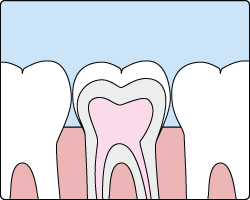Fluoride and Sealants
Fluoride
Using Fluoride to Protect Your Teeth
You brush your teeth twice a day, floss regularly and visit the dentist every six months, but did you know that rinsing with fluoride — a mineral that helps prevent cavities and tooth decay — also helps keep your teeth healthy and strong?
Fluoride is effective in preventing cavities and tooth decay by coating your teeth and preventing plaque from building up and hardening on the tooth's surface.
Fluoride comes in two varieties, systemic and topical:
- Systemic fluoride is ingested, usually through a public water supply. While teeth are forming under the gums, the fluoride strengthens tooth enamel, making it stronger and more resistant to cavities.
- Fluoride can also be applied topically to help prevent caries (cavities) on teeth present in the mouth. It is delivered through toothpaste, mouthwash, and professional fluoride applications.
Receiving a fluoride treatment from your dentist
A fluoride treatment in your dentist's office takes just a few minutes. After the treatment, patients may be asked not to rinse, eat, or drink for at least 30 minutes in order to allow the teeth to absorb the fluoride. Depending on your oral health or your doctor's recommendation, you may be required to have a fluoride treatment every three, six, or 12 months. Your doctor may also prescribe an at-home fluoride product such as a mouthwash, gel, or antibacterial rinse.
How to choose the right fluoride treatment
When choosing your own at-home fluoride product (such as toothpaste or mouthwash), always check for the American Dental Association's (ADA) seal of acceptance. Products marked with the ADA seal of approval have been carefully examined by the ADA, and approved based on safety and effectiveness. Take care of your teeth and smile bright with dental fluoride treatments!
Sealants

Sometimes brushing is not enough, especially when it comes to those hard-to-reach spots in your mouth. It is difficult for your toothbrush to get in between the small cracks and grooves on your teeth. If left alone, those tiny areas can develop tooth decay. Sealants give your teeth extra protection against decay and help prevent cavities.
Dental sealants are plastic resins that bond and harden in the deep grooves on your tooth's surface. When a tooth is sealed, the tiny grooves become smooth and are less likely to harbor plaque. With sealants, brushing your teeth becomes easier and more effective.
Sealants are typically applied to children's teeth after their permanent teeth have erupted as a preventive measure against tooth decay. However, adults can also receive sealants on healthy teeth. It is more common to seal permanent teeth rather than baby teeth, but every patient has unique needs, and your dentist will recommend sealants on a case-by-case basis.
Sealants typically last from three to five years, although it is fairly common to see adults with sealants still intact from childhood. A dental sealant only provides protection when it is fully intact so if your sealants come off, let your dentist know, and schedule an appointment for your teeth to be resealed.





